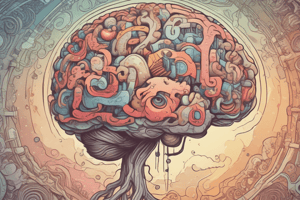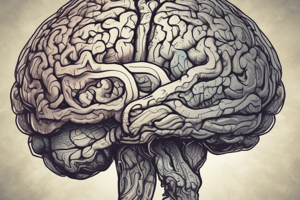Podcast
Questions and Answers
What is the sequence of developmental periods in child development?
What is the sequence of developmental periods in child development?
- Infancy, Early childhood, Late childhood, Adolescence
- Middle childhood, Infancy, Late childhood, Early childhood
- Prenatal period, Infancy, Early childhood, Adolescence (correct)
- Infancy, Prenatal period, Early childhood, Adolescence
Which process is NOT mentioned as contributing to development during childhood?
Which process is NOT mentioned as contributing to development during childhood?
- Cognitive processes
- Economic processes (correct)
- Socioemotional processes
- Biological processes
During which developmental period does self-control increase?
During which developmental period does self-control increase?
- Prenatal period
- Adolescence
- Early childhood (correct)
- Infancy
What are the three primary processes of development noted in childhood?
What are the three primary processes of development noted in childhood?
At what age range does the Infancy developmental period typically occur?
At what age range does the Infancy developmental period typically occur?
What does achievement become more central in during early childhood?
What does achievement become more central in during early childhood?
Which developmental period follows Early childhood?
Which developmental period follows Early childhood?
Which of the following developmental stages occurs from 6 to 11 years?
Which of the following developmental stages occurs from 6 to 11 years?
What factors modify genetic activity during childhood?
What factors modify genetic activity during childhood?
Which statement best explains the relationship between heredity and environment?
Which statement best explains the relationship between heredity and environment?
What is not a quantifiable aspect of heredity and environment's contributions to a child's development?
What is not a quantifiable aspect of heredity and environment's contributions to a child's development?
According to the content, when does genetic expression occur?
According to the content, when does genetic expression occur?
Which of the following is a misconception about genetic influence on behavior?
Which of the following is a misconception about genetic influence on behavior?
What does David Moore criticize about simplistic views of genetic systems?
What does David Moore criticize about simplistic views of genetic systems?
Why can't the contributions of heredity and environment be precisely defined?
Why can't the contributions of heredity and environment be precisely defined?
What role does environment play in genetic activity according to the content?
What role does environment play in genetic activity according to the content?
What does Alexander's high mathematics scores and average reading scores exemplify?
What does Alexander's high mathematics scores and average reading scores exemplify?
Which aspect is emphasized by the view that brain development is influenced by experiences?
Which aspect is emphasized by the view that brain development is influenced by experiences?
What is the primary focus of Vygotsky's cognitive development theory?
What is the primary focus of Vygotsky's cognitive development theory?
What is a key difference between Piaget’s and Vygotsky’s theories?
What is a key difference between Piaget’s and Vygotsky’s theories?
Which of the following best describes the nature versus nurture debate in cognitive development?
Which of the following best describes the nature versus nurture debate in cognitive development?
Which term refers to the concept that the brain's structure can change based on experiences?
Which term refers to the concept that the brain's structure can change based on experiences?
Which of the following best exemplifies the importance of early experiences in brain development?
Which of the following best exemplifies the importance of early experiences in brain development?
How did earlier views on brain development differ from current understanding?
How did earlier views on brain development differ from current understanding?
What happens to the connections between neurons as children and adolescents develop?
What happens to the connections between neurons as children and adolescents develop?
What significant change occurs in the corpus callosum during adolescence?
What significant change occurs in the corpus callosum during adolescence?
At what age does the prefrontal cortex typically finish maturing?
At what age does the prefrontal cortex typically finish maturing?
Which system matures earlier than the prefrontal cortex in adolescents?
Which system matures earlier than the prefrontal cortex in adolescents?
Which part of the limbic system is especially involved in emotion?
Which part of the limbic system is especially involved in emotion?
Why might adolescents struggle with controlling their emotions?
Why might adolescents struggle with controlling their emotions?
What is a consequence of the pruning process that occurs during adolescence?
What is a consequence of the pruning process that occurs during adolescence?
Which statement regarding adolescents' brains is accurate?
Which statement regarding adolescents' brains is accurate?
What is commonly stated about the left-brained and right-brained individuals?
What is commonly stated about the left-brained and right-brained individuals?
What is the critical period in regard to learning?
What is the critical period in regard to learning?
What conclusion does one neuroscientist draw regarding learning and brain development?
What conclusion does one neuroscientist draw regarding learning and brain development?
What is a major debate concerning brain development?
What is a major debate concerning brain development?
What influences the thickening of the prefrontal cortex during adolescence?
What influences the thickening of the prefrontal cortex during adolescence?
How do experts view the implications of brain science for children's education?
How do experts view the implications of brain science for children's education?
What is the relationship between synaptic formation and learning according to some neuroscientists?
What is the relationship between synaptic formation and learning according to some neuroscientists?
What aspect of development is primarily discussed in relation to children and adolescents?
What aspect of development is primarily discussed in relation to children and adolescents?
Flashcards are hidden until you start studying
Study Notes
Periods of Development
- Prenatal period: Conception to Birth
- Infancy: Birth to 18-24 months
- Early childhood: 2-5 years
- Middle and late childhood: 6-11 years
- Adolescence: 10-12 to 18-21 years
Brain Development
- Brain is plastic and develops based on experiences
- Connections between neurons are "pruned" during development
- Adolescent brains undergo structural changes
- Corpus callosum thickens, improving information processing
- Prefrontal cortex finishes maturing in emerging adulthood (18-25 years)
- Limbic system matures earlier, responsible for emotions and reward
Critical Periods
- There is a biological window of opportunity for learning
- However, some experts argue that this view is exaggerated
- Learning likely takes place after synaptic formation stabilizes (after 10 years old)
Nature vs. Nurture
- The relative contributions of heredity and environment are not quantifiable
- Genes produce proteins throughout the lifespan in different environments
- Experiences can modify genetic activity and nervous system activity
- Scientists are still investigating whether brain changes come first or are a result of experiences
Studying That Suits You
Use AI to generate personalized quizzes and flashcards to suit your learning preferences.




